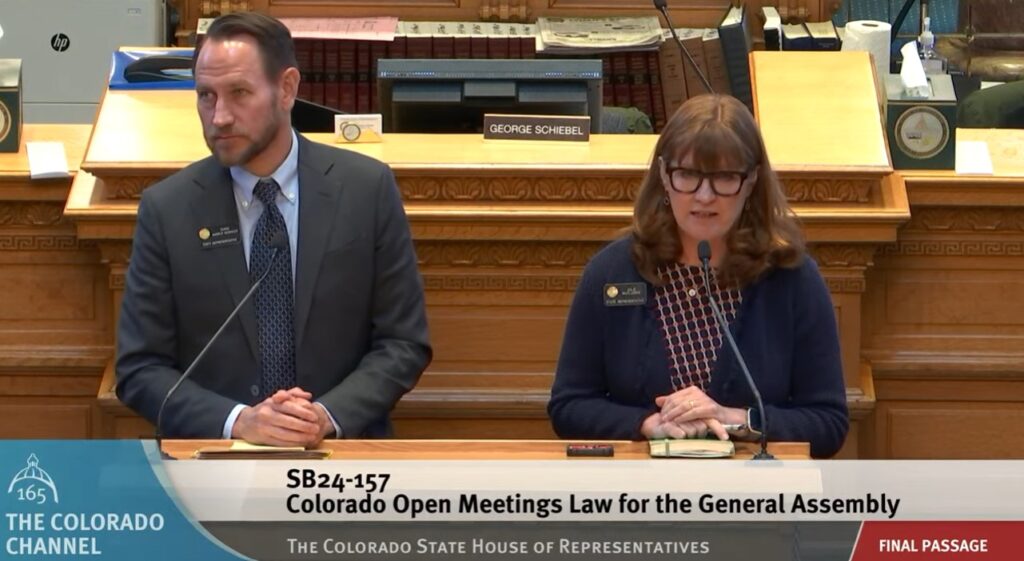Update: Gov. Jared Polis signed SB 24-157 into law on Tuesday, March 12. The governor wrote in a signing statement: “As a coequal branch of government, the Executive should rarely intrude on the inner workings of the Legislature, and the Executive Branch warrants the same deference from the Legislature on its internal operations.”
By Jeffrey A. Roberts
CFOIC Executive Director
State lawmakers Monday sent a bill to Gov. Jared Polis that narrows the definition of “public business’ in the Colorado Open Meetings Law as it applies to the legislature and lets members of the General Assembly communicate by email and text message without it being a “meeting” under the law.
Senate Bill 24-157 is necessary because the open meetings law, enacted by the voters of Colorado in 1972, “clearly does not meet the way we do business in a modern legislative workplace,” said House Speaker Julie McCluskie, a primary sponsor of the measure.

“We exist now in a digital age, where cellphones, email communication, written communication happens at a lightning pace and is something that a 1972 law could never contemplate or imagine,” the Dillon Democrat told fellow legislators during second reading on the bill Friday. “The democratic process thrives when we make connections, invest in understanding each other, listen to one another, connect and learn.”
But opponents of the bill, which passed the House on a 39-22 final vote, are concerned it will make the legislative process less transparent for the public and press. The legislature has been sued twice in the past year over open meetings law issues, with a judge ruling in January that its use of an anonymous “quadratic voting” system to rank bills violated the statute and the House agreeing last September to bar representatives from auto-deleting messages exchanged among themselves.
“We have an opaque process. Even with the CORA (Colorado Open Records Act), we have a very opaque process,” said Rep. Ken DeGraaf, R-Colorado Springs. “This is going to make it more opaque. That is not the way to build trust with the people of Colorado.”
In committee testimony, the Colorado Freedom of Information Coalition said the bill will encourage state lawmakers to formulate and debate public business in an unlimited way via email, text message and ephemeral messaging apps such as Signal without the public’s knowledge and scrutiny.
If such electronic communications haven’t already been deleted, we stressed, they likely would not be available to request because CORA excludes “[a]ll documents prepared or assembled by a member of the general assembly relating to the drafting of bills or amendments” from the definition of “public records.” Those are considered “work product.”
For the past 52 years, the open meetings law has declared it to be “a matter of statewide concern and the policy of this state that the formation of public policy is public business and may not be conducted in secret.”
The law requires state public bodies such as the legislature and its committees to open meetings of two or more members at which public business is discussed or formal action is taken. For state public bodies, “full and timely” notice is required before meetings at which the adoption of any proposed policy, position, resolution, rule, regulation or formal action occurs or at which a majority or quorum is expected to be in attendance. Minutes must be “taken and promptly recorded.”
Subject to the law are meetings held “electronically,” which covers email and text-message conversions about public business, defined by Colorado courts to mean that a “demonstrated link” exists between the meeting’s content and the public body’s policy-making responsibilities. As currently written, the statute lets elected officials exchange emails about scheduling and their availability, and pose questions for later discussion, but they can’t discuss the “merits or substance” of pending legislation or public business without risking a violation of the law.
If SB 24-157 is signed by the governor, “any form of written communication, electronic or otherwise, exchanged by two or more members of the General Assembly” would not be subject to the open meetings law, but any records of those communications would still be subject to disclosure “to the extent required by the Colorado Open Records Act.” Notice and minutes would not be required for meetings where a quorum is not “contemporaneous,” also exempting communications by email, text message or other electronic means.
The definition of “public business,” as it pertains to the legislature, is limited in SB 24-157 to introduced legislation and other matters before a committee. It could also mean draft legislation discussed by a quorum of a committee during a legislative session or by a quorum of an interim committee.
Rep. Bob Marshall, one of two legislators who sued the House last year over open meetings issues, said the bill “may have overshot the goal” by applying the law only to contemporaneous quorums. In floor debate, the Highlands Ranch Democrat mentioned his successful lawsuit against four members of the Douglas County school board who were found by a judge to have violated the Sunshine Law by firing the superintendent in a series of one-on-one meetings.
“The contemporaneous component is a difficult one to thread, but it’s very important because we’ve already just given a roadmap to basically violate the entire open meetings law’s purpose without some kind of guardrails around that,” he said.
Reforms are needed, added Marshall, who said he believes electronic communications never should have been considered meetings under the open meetings law. “But without any retention requirement for those documents, go right back to automatic deletion and they will never be open and transparent to individuals who might want the ability to see what we’re doing.”
Republican House members tried unsuccessfully Monday to have SB 24-157 sent back to the House Judiciary Committee for further consideration. “We don’t feel that our constituents and stakeholders were fully involved in the process,” said Rep. Ty Winter, R-Trinidad, the assistant minority leader. “And I truly believe that we missed an opportunity for both sides, along with our citizens, to get together and try to come up with a piece of legislation that would make all sides happy.”
But Rep. Chris deGruy Kennedy, a Lakewood Democrat who co-sponsored SB 24-157, said, “Everyone knows what’s in the bill. We’re ready to vote on it.”
“As we reflect on the three things we’re doing in the bill, none of this is shielding the public from being able to see what we’re doing,” Kennedy added. “I think that it is fair to say that these are clarifications and definitions of how this bill is supposed to operate … We’re not trying to pretend that we got it perfectly right, but I have not yet heard better solutions.”
As amended in the Senate, SB 24-157 requires legislative leaders over the next three years to discuss the open meetings law as it applies to the General Assembly during meetings of their executive committee and to take public comment during such meetings.
Follow the Colorado Freedom of Information Coalition on Twitter @CoFOIC. Like CFOIC’s Facebook page. Do you appreciate the information and resources provided by CFOIC? Please consider making a tax-deductible donation.




